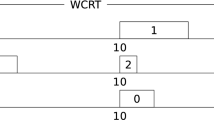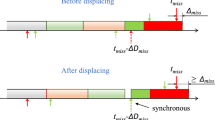Abstract
Many applications have a mixed-criticality nature. They contain tasks with a different criticality, meaning that a task with a lower criticality can be skipped if a task with a higher criticality needs more time to be executed. This paper deals with a mixed-criticality scheduling problem where each task has a criticality given by a positive integer number. The exact processing time of the task is not known. Instead, we use different upper bounds of the processing time for different criticality levels of the schedule. A schedule with different criticality levels is generated off-line, but its on-line execution switches among the criticality levels depending on the actual values of the processing times. The advantage is that after the transient prolongation of a higher criticality task, the system is able to match up with the schedule on a lower criticality level. While using this model, we achieve significant schedule efficiency (assuming that the prolongation of the higher criticality task rarely occurs), and at the same time, we are able to grant a sufficient amount of time to higher criticality tasks (in such cases, some of the lower criticality tasks may be skipped). This paper shows a motivation for the non-preemptive mixed-criticality match-up scheduling problem arising from the area of the communication protocols. Using a polynomial reduction from the 3-partition problem, we prove the problem to be \(\mathcal {NP}\)-hard in the strong sense even when the release dates and deadlines are dropped and only two criticality levels are considered.



Similar content being viewed by others
References
Aktürk, M. S., Atamtürk, A., & Gürel, S. (2010). Parallel machine match-up scheduling with manufacturing cost considerations. Journal of Scheduling, 13(1), 95–110.
Barhorst, J., Belote, T., Binns, P., Hoffman, J., Paunicka, J., Sarathy, P., Stanfill, J., Stuart, D., & Urzi, R. (2009). A research agenda for mixed-criticality systems. In 15th IEEE real-time and embedded technology and applications symposium.
Baruah, S., Bonifaci, V., D’Angelo, G., Li, H., Marchetti-Spaccamela, A., Megow, N., et al. (2012). Scheduling real-time mixed-criticality jobs. IEEE Transactions on Computers, 61(8), 1140–1152.
Baruah, S., & Fohler, G. (2011). Certification-cognizant time-triggered scheduling of mixed-criticality systems. In: Real-time systems symposium 2011 (pp. 3–12). IEEE Computer Society.
Baruah, S., Li, H., & Stougie, L. (2010). Towards the design of certifiable mixed-criticality systems. Real-time and embedded technology and applications symposium, RTAS (pp. 13–22). Washington, DC: IEEE Computer Society.
Ben-Tal, A., El Ghaoui, L., & Nemirovski, A. (2009). Robust optimization. Princeton: Princeton University Press.
Bertsimas, D., Brown, D., & Caramanis, C. (2011). Theory and applications of robust optimization. SIAM Review, 53(3), 464–501.
Błazewicz, J., Ecker, K., Schmidt, G., & Wȩglarz, J. (2001). Scheduling computer and manufacturing processes (2nd ed.). Berlin: Springer.
Briand, C., La, H., & Erschler, J. (2007). A robust approach for the single machine scheduling problem. Journal of Scheduling, 10(3), 209–221.
Burns, A., & Davis, R. (2013). Mixed criticality systems—a review. http://www-users.cs.york.ac.uk/~burns/review.pdf. Department of Computer Science, University of York.
Fung, S. (2014). Online scheduling with preemption or non-completion penalties. Journal of Scheduling, 17(2), 173–183.
Hanzalek, Z., & Pacha, T. (1998). Use of the fieldbus systems in academic setting. In: Proceedings on real-time systems education III (pp. 93–97).
Lemke, M., Konstantellos, A., Riemenschneider, R., Steinhoegl, W., Tsarchopaulos, P., & Cotta, J. (2012). Workshop on mixed criticality systems, Brussels.
Lenstra, J. K., Rinnooy Kan, A. H. G., & Brucker, P. (1977). Complexity of machine scheduling problems. Annals of Discrete Mathematics, 1, 343–362.
Nelson, A., Goossens, K., & Akesson, B. Dataflow formalisation of real-time streaming applications on a composable and predictable multi-processor SOC. Journal of Systems Architecture (in press).
Shabtay, D., Gaspar, N., & Kaspi, M. (2013). A survey on offline scheduling with rejection. Journal of Scheduling, 16(1), 3–28.
Shabtay, D., & Steiner, G. (2007). A survey of scheduling with controllable processing times. Discrete Applied Mathematics, 155(13), 1643–1666.
Slotnick, S. A. (2011). Order acceptance and scheduling: A taxonomy and review. European Journal of Operational Research, 212(1), 1–11.
Sojka, M., Pisa, P., Faggioli, D., Cucinotta, T., Checconi, F., Hanzalek, Z., et al. (2011). Modular software architecture for flexible reservation mechanisms on heterogeneous resources. Journal of Systems Architecture, 57(4), 366–382.
Soyster, A. L. (1973). Technical note on convex programming with set-inclusive constraints and applications to inexact linear programming. Operations Research, 21(5), 1154–1157.
Theis, J., & Fohler, G. (2013). Mixed criticality scheduling in time-triggered legacy systems. In: 1st workshop on mixed criticality systems, IEEE real-time systems symposium.
Theis, J., Fohler, G., & Baruah, S. (2013). Schedule table generation for time-triggered mixed criticality systems. In: 1st workshop on mixed criticality systems, IEEE real-time systems symposium.
Thevenin, S., Zufferey, N., & Widmer, M. (2014). Metaheuristics for a scheduling problem with rejection and tardiness penalties. Journal of Scheduling, 18, 89–105.
Vestal, S. (2007). Preemptive scheduling of multi-criticality systems with varying degrees of execution time assurance. In: Real-time systems symposium, RTSS (pp. 239–243).
Author information
Authors and Affiliations
Corresponding author
Additional information
This work was supported by the US Department of the Navy Grants N62909-12-1-7009 and N62909-15-1-N094 issued by Office Naval Research Global. The United States Government has a royalty-free license throughout the world in all copyrightable material contained herein.
Rights and permissions
About this article
Cite this article
Hanzálek, Z., Tunys, T. & Šůcha, P. An analysis of the non-preemptive mixed-criticality match-up scheduling problem. J Sched 19, 601–607 (2016). https://doi.org/10.1007/s10951-016-0468-y
Published:
Issue Date:
DOI: https://doi.org/10.1007/s10951-016-0468-y




